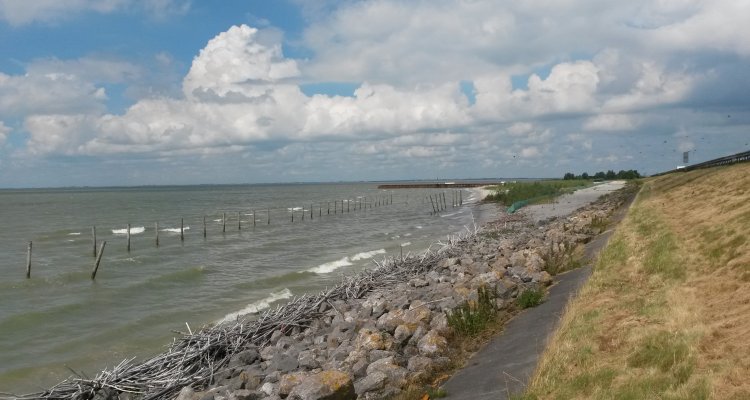
IJsselmeer region: water management, nature and economic development
Wageningen University & Research is conducting multi-year research in the IJsselmeer region on behalf of the Ministries of Agriculture, Nature Conservation and Food Quality, Infrastructure and Water Management, Rijkswaterstaat and the Ecoshape foundation among other organisations. We are working closely with organisations such as the Dutch Society for Nature Conservation, Deltares and PBL in networks such the National Knowledge Programme on Water & Climate (NKWK), LIFE IP Delta Nature and the national Delta Programme. There are also various research projects originating from Wageningen University, and consultancy work is being done for the surrounding provinces and water boards.
The IJsselmeer, the Markermeer and the Veluwe peripheral lakes are strongly impacted by regional economic developments. In addition, the climate is changing, and the effects of the Zuiderzee Works (1920-1975) are still noticeable. There is a major housing challenge and the Markermeer and IJsselmeer are a strategic freshwater reservoir for potable water and agriculture. The national and municipal governments are working on a future-proof ecological water system (TBES). Water Framework Directive measures have been agreed, and the Natura 2000 management plans are ready. Additional measures are now being considered in order to make water and nature management future- and climate-proof, such as the realisation of the Marker Wadden island group and the Fish Migration River project at the Afsluitdijk.
Focus of the research
The research focuses on the following:
- Ecological carrying capacity of the water systems and riparian zones (food supply for birds, fish, fisheries) in the IJsselmeer region;
- Sustainable economic exploitation of natural resources (freshwater supply, biodiversity, sediment and energy) through recreation, fisheries and agriculture;
- Fisheries and developments in fish stocks Charting the effects of economic development, modified water management and climate change on the options for restoring ecological resilience;
- Predicting the effect of interventions, management and maintenance on the water system/ ecosystem, Natura 2000/ WFD targets, ecosystem services and natural capital;
- Applying and elaborating the concept Building with Nature in collaboration with partners;
- Governance: the role of collaboration between the sectors involved and different lines of policy in the IJsselmeer Region at a regional and national level, as well as legal aspects of water and nature policy.
Long-term programmes
Various WUR departments are involved in this research, including Wageningen Environmental Research, Wageningen Marine Research, Wageningen Economic Research and Wageningen University. Funding for research in the IJsselmeer via the Ministry of Agriculture, Nature Conservation and Food Quality takes place through three long-term programmes:
Long-term Ecological Ambitions Delta Waters (In Dutch: Natuurambitie Grote Wateren, NAGW) (policy-supporting research) (2015-2020) The role that benthic macro fauna play in the food web of the Markermeer is being researched within this programme. WUR supports the national government in the decision-making process about considered measures within the National Water Plan and the national Delta Programme regarding the IJsselmeer Region. Consideration is also given to solutions for administrative bottlenecks that may hamper the implementation of measures for ecological restoration. This research is being done in close collaboration with Rijkswaterstaat and LIFE-IP Delta Nature.
- More about the programme Long-term Ecological Ambitions Delta Waters (NAGW)
- Memorandum ‘NAGW IN PRACTICE’: Status of Natura 2000 objectives in Marker Lake and possible impacts of the realisation of the Marker Wadden islands
- Quick scan ‘Bottlenecks in administrative and legal agreements for nature in the Dutch Delta waters’
Statutory research tasks (unlimited period) The Centre for Fisheries Research (CVO) researches the development of fish and shellfish stocks in the sea and in the IJsselmeer with a view to advising government on fisheries management. Evaluation of nature policy in the IJsselmeer region is a task for SRT Nature and Environment.
- Centre for Fisheries Research
- SRT Nature and Environment
- Trends in eel fisheries (2015-2016)
- Status of fish and fisheries in National Freshwater Bodies: 2015
Policy-Supporting Research “Duty of care for resilient nature” (Natura 2000) In 2015, four projects were carried out within the BO research theme “Duty of care for resilient nature” concerning the embedding of Natura 2000 management plans, including the waters of the IJsselmeer Region:
- Fitness Check Bird and Habitat Directive: opportunities and bottlenecks
- Opportunities for more robust ecosystems in Natura 2000 regions
- Opportunities for robust nature in the Netherlands (outside Natura 2000 regions)
Knowledge Base Theme ‘System Earth Management’ (SEM; 2015-2018) Research in the IJsselmeer region is funded by Knowledge Base Theme SEM (along with the EcoShape foundation). This research focuses on the elaboration in detail and application of the concept ‘Building with Nature’. The Knowledge Base research in the IJsselmeer Region focusses here on the ‘Houtribdijk’ pilot project and the sand supplementation pilot projects along the IJsselmeer coastline in Friesland.
- Friesian IJsselmeer coastline sand engine
- Houtribdijk Pilot Project
- Natural IJsselmeer: IJsselmeer 2100 ecodynamic vision
Top Sector Water - Delta Technology TKI programme
Wageningen University & Research also focuses on Building with Nature in the Delta Technology TKI programme, and is involved in the Marker Wadden TKI pilot project. In addition, within the Water Top Sector we are developing measurement methods with a view to assessing the distribution effects of pesticides and herbicides in and on the water environment.